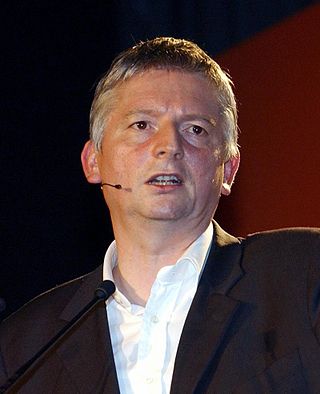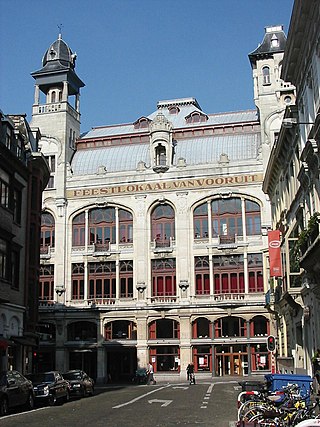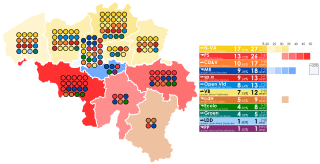
The Open Flemish Liberals and Democrats is a Flemish conservative liberal political party in Belgium. A smaller fraction within the party has social liberal views.
Vooruit is a Flemish social democratic political party in Belgium. The party was known as the Flemish Socialist Party until 21 March 2021, when its current name was adopted.

Groen, founded as Agalev, is a green Flemish political party in Belgium. Its French-speaking equivalent is Ecolo; the two parties maintain close relations with each other.

Sociaal-Liberale Partij was a Belgian Flemish political party formed after dissolution of the moderate nationalist People's Union (Volksunie) party. Prior to 19 April 2008 it was known as Spirit, and intermediately as Flemish Progressives (VlaamsProgressieven). The party merged with Groen in the end of 2009, ceasing to exist.

The Flemish Movement is an umbrella term which encompasses various political groups in the Belgian region of Flanders and, less commonly, in French Flanders. Ideologically, it encompasses groups which have sought to promote Flemish culture and the Dutch language as well as those seeking greater political autonomy for Flanders within Belgium. It also encompassed nationalists who seek the secession of Flanders from Belgium, either through outright independence or unification with the Netherlands.
On 13 June 2004, regional elections were held in Belgium, to choose representatives in the regional councils of the Flemish Parliament, the Walloon Parliament, the Brussels Parliament and the German-speaking Community of Belgium. The elections were held on the same day as the European elections.
The SP.a–SPIRIT was a Belgian electoral coalition between the Flemish parties Socialist Party Different (SP.a) and Spirit. In the general elections on June 10, 2007, the Social Liberal party formed an electoral alliance with the Socialist Party Different (sp.a) and won 14 of the 88 Flemish seats in the House of Representatives and 4 of the 40 Flemish seats in the Senate.

Flanders is both a cultural community and an economic region within the Belgian state, and has significant autonomy.

Steve Stevaert was a Belgian politician of the Flemish Socialist Party: the SP.A.

Flemish political parties operate in the whole Flemish Community, which covers the unilingual Flemish Region and the bilingual Brussels-Capital Region. In the latter, they compete with French-speaking parties that all also operate in Wallonia. There are very few parties that operate on a national level in Belgium. Flanders generally tends to vote for right-wing, conservative parties, whereas in French-speaking Belgium the socialist party is usually the most successful one.

Marie Louise "Mia" De Vits is a Belgian politician.
The Davidsfonds is a Catholic organisation in Flanders, Belgium with the purpose of promoting the Flemish culture in the areas of literature, history and art.

The Order of Flemish Militants – originally the Flemish Militants Organisation – was a Flemish nationalist activist group in Belgium defending far-right interests by propaganda and political action. Established in 1949, they helped found the People's Union in 1954, a Belgian political party. The links between the extremist VMO and the VU lessened as the party moved towards the centre. In later decades the VMO would become linked to neo-Nazism and a series of paramilitary attacks on immigrants and leftists before disappearing by the late 1980s.

The Belgian Socialist Party was a social-democratic political party which existed in Belgium from 1945 to 1978. During its time in office, a number of progressive social reforms were introduced.
The Vermeylenfonds is a non-profit Flemish cultural socialist organization. The Vermeylenfonds was founded in 1945, in Brussels with the aim of studying and of continuing the work of August Vermeylen. The Vermeylenfonds was set up within the framework of the enlargement process of the Flemish movement which consisted until then mainly of catholic (Davidsfonds) and liberal (Willemsfonds) organizations. For a long time the Vermeylenfonds also participated in the political debate in Flanders as a lobbying group.

Vooruit is a historic complex in Ghent, Belgium. Vooruit was originally the festival and art center of the Ghent-based labor movement, with a ballroom, cinema, theater, etc. It is now mainly used for concerts and other cultural events.

Federal elections were held in Belgium on 13 June 2010, during the midst of the 2007-11 Belgian political crisis. After the fall of the previous Leterme II Government over the withdrawal of Open Flemish Liberals and Democrats from the government the King dissolved the legislature and called new elections. The New Flemish Alliance, led by Bart De Wever, emerged as the plurality party with 27 seats, just one more than the francophone Socialist Party, led by Elio Di Rupo, which was the largest party in the Wallonia region and Brussels. It took a world record 541 days until a government was formed, resulting in a government led by Di Rupo.

The Duitsch-Vlaamsche Arbeidsgemeenschap, better known as DeVlag, was a small radical pro-Nazi organization active in Flanders during the German occupation of Belgium. It was founded in 1936 by academics Jef Van de Wiele and Rolf Wilkening as a cultural association to strengthen the exchange of students and professors between the universities of Leuven and Cologne.

Leona Maria Detiège is a Belgian politician.
This page is based on this
Wikipedia article Text is available under the
CC BY-SA 4.0 license; additional terms may apply.
Images, videos and audio are available under their respective licenses.













